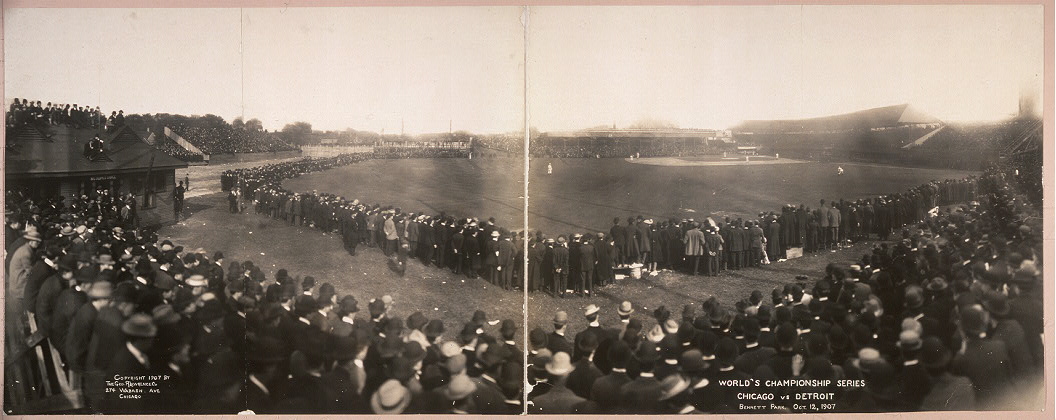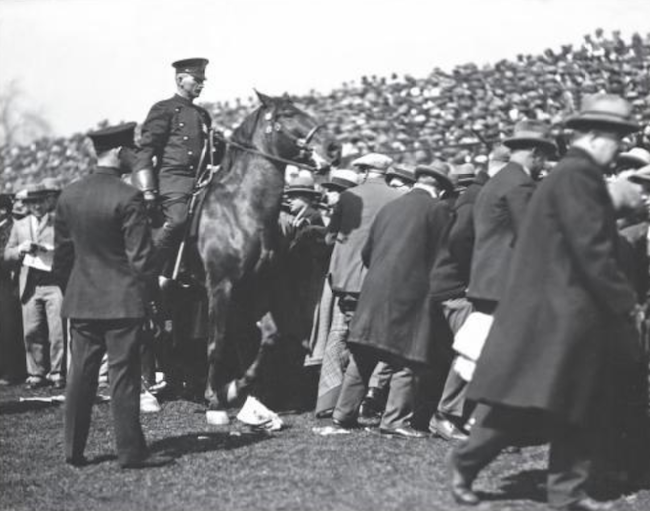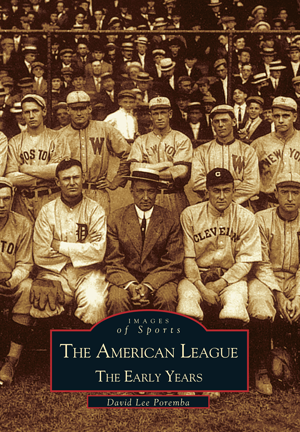
With baseball season finally underway — for now, at least — many fans have turned to the diamond. That includes Tigers fans in Detroit, but at least they’re used to some chaos. This team came out of the womb scratching and snarling, the only Major League franchise to sign a star player out of prison, which happened twice. One ex-player tried to burn and dismember a group of men after they kidnapped his mother. And then there was Ty Cobb.
But one of the strangest Tigers stories involves early owner James D. Burns, who orchestrated the only known arrest of a journalist while covering a game.
Worst Owner Ever?
Burns bought the team in 1900 for $12,000. The blustery new owner — and future Wayne County sheriff — wasted no time trying to bend the law to his advantage.
The Tigers played their home games at Bennett Park, one of the era’s many beautiful facilities. On August 4, 1900, Burns had Chicago sportswriter Sherman Duffy arrested in the park’s press box during a game against the Chicago White Sox. His “crime”? He wrote a stork that ticked Burns off, so the Tigers owner had the reporter thrown in jail on criminal libel charges.
A pair of Wayne County deputies “did not even give the newspaperman a chance to finish scoring the game, but took him . . . to jail and locked him up,” the Detroit News reported.
The Article

Duff’s “criminally libelous” article had appeared a couple of weeks earlier after Tigers fans had started one of many riots at Bennett Park. The bleacherites were angry about some of the calls made by umpire Joe Cantillon. So, after the 4-2 Tiger loss, dozens of rowdy fans rushed the field, threatening to tear the ump to pieces.
Read more about the chaotic history of the Detroit Tigers here!
Police had to form a cordon around Cantillon and escort him to the nearby Barclay Hotel. Several dozen fans hung around outside the hotel for hours, hollering threats until their throats presumably gave out.
Duffy’s article in the Chicago paper decried the “disgraceful assault on an umpire. . . . Owner and manager of the Detroit club are responsible.”
The Lawsuit
This enraged that owner, and Burns sued the reporter and the Chicago newspaper. In the Wayne County Circuit Court filing, which sought $10,000 in damages, Burns proclaimed that the accusations in the offending article were “maliciously and wrongfully made; that [Burns] was not responsible for, and did not incite, the spectators . . . that the spectators . . . were not disreputable or disorderly persons, but persons of respectable, intelligent, and refined people of the city of Detroit.”
After the suit was filed, Burns bided his time until the White Sox returned to Detroit. They arrived on Thursday, August 2, but the vindictive Tiger owner waited until that Saturday before having the deputies storm the press box. According to the News, Burns asked the deputies to wait to arrest the reporter until after the courts had closed on Saturday at 4 p.m. — so that Duffy would languish in the Wayne County Jail until Monday morning.
The Aftermath
Thankfully, a judge released Duffy on a $500 bond after only a few hours. When American League president Ban Johnson learned of the stunt, he was furious. “The arrest was a malicious act on the part of Burns,” the president said. “It will kill him in baseball, and every lover of clean ballplaying, fair dealing, and all that goes to make the national game what it has been, the best of sports, should cry him down.”
It’s the only known instance in American sports history in which a journalist was arrested in the press box while covering a game because a team owner didn’t like his article. But it seems all too familiar today — when sports owners and other wealthy figures feel empowered to sue anyone writing anything less than positive about their public lives.
Want to learn more? Check out these similar titles below!




